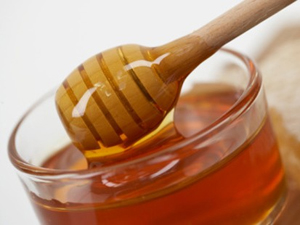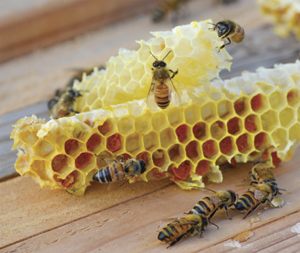BY STEPHANIE LOUGH
 Winnie the Pooh, we get you. We understand why you are constantly getting stuck with your nose in the honey jar, or running from the swarm of a nearby hive you snagged.
Winnie the Pooh, we get you. We understand why you are constantly getting stuck with your nose in the honey jar, or running from the swarm of a nearby hive you snagged.
You are obviously one health-conscious Pooh Bear.
Don’t let the sugary deliciousness – or Pooh’s belly full of fluff – fool you; honey is one of nature’s super foods.The sappy, sticky stuff we love to put on our toast is packed full of antioxidants that support the immune system and antibacterial properties that are believed to improve digestion.
It can work as a natural remedy for cuts and burns, rashes and sore throats. It helps boost energy and eases hangovers.
It could help fix one of our nation’s biggest health problems, as using honey while baking or making sugary drinks like lemonade can greatly reduce a family’s intake of refined sugars – one of the leading causes of our country’s obesity epidemic.
Recent studies are now showing that honey can even help build a tolerance against allergies.
That is, if you are buying real honey.
While all honey is essentially made the same (by bees regurgitating nectar, but try not to focus on that), not all of the honey is the same by the time it makes it to the shelf.
The majority of mass-produced honey goes through intensive pasteurization to kill any bacteria present. This process involves heating and filtering the honey, which also removes any particles and most of the beneficial nutrients and antioxidants. The end product is not technically honey, but nectar.
Natural honey has not been pasteurized in any way, thus keeping the nutrients intact, and is sold three ways: liquid honey, raw honey, and honeycombs. Liquid honey most resembles what comes from the fun-shaped squeeze bottles as it has been filtered to remove any wax, but has not been pasteurized.
Natural honey can be found at most organic food stores, but it’s recommended to go to a nearby farmers’ market to ensure it is locally produced. Beekeepers and farmers can be very knowledgeable, and asking where the bee farms are located, and the type of fauna in the area, might actually provide even more health benefits.
New studies are determining if a person who consumes honey from the same geographical region in which they live may be able to desensitize himself from allergies. In theory, a person’s allergies are often caused by pollen from flowering plants, possibly the same pollen the bees used to make their honey. By consuming the honey, the immune system is exposed to this pollen, eventually building strength against it.
While this theory has been upheld for decades, studies have just been done in the past few years on the correlation between natural local honey and allergies. So far, no real benefit has been proved; however, these studies are criticized for using small sample sizes and not having long-term data.
Still, there are hundreds of single cases in which a person reported less severe or no allergies after regularly consuming local, natural honey.
For mother Chrissy Miller, ditching the store-bought goods and seeking out natural honey was an obvious decision.
“I have not always used local honey. I actually started buying it when I was pregnant with my first son,” said Miller, who has a son, Dax, 2, and is expecting another boy in October. “I had a huge sweet tooth and was trying to stay away from candy and sodas. A friend suggested that I buy honey sticks from the farmers market, and I was in love immediately.”
The effect that honey had on her allergies, which followed Miller from Florida to Oregon before moving to Phoenix, was just a bonus.
“I have noticed [a difference]. I have not had any issues with allergies in the four years that I have been eating local honey.”
While more expensive than commercial honey, Miller says it is worth it. She gives a spoonful to her toddler when he is sick, on his cuts and burns, and uses it to bake organic cupcakes. During pregnancy, when especially conscious of any chemicals she could be exposing herself to, she uses honey for facials and as a moisturizer.
The best part?
“I don’t have to feel guilty about giving my kids a sweet treat.”
A sweet economy
Miller learned most of her tricks from the honey stand, Absolutely Delicious, at her local farmers’ market. The family-owned business sells honey from a handful of beekeepers around Arizona. On top of keeping her family healthy, being able to support a local, family-owned business keeps Miller coming back every few weeks.
Bees are a critical part the economy, and not only because of honey and the dozens of other byproducts like beeswax and bee pollen. Bees also pollinate about one-third of U.S. crops as well as the plants given to livestock – industries that are worth more than $10 billion each year.
byproducts like beeswax and bee pollen. Bees also pollinate about one-third of U.S. crops as well as the plants given to livestock – industries that are worth more than $10 billion each year.
The scary fact is, though, the honeybee population is on a sharp decline, and has been for the past decade in what is known as Colony Collapse Disorder (CCD), a phenomenon in which colonies seemingly disappear. While there is no single reason, contributing factors include pesticides, disease, and environmental changes. Some even cite cell phone radiation as a cause of CCD. Without bees, our world’s food structure would be greatly compromised. From fruits and vegetables to bacon and steak, coffee and juice, cooking oils and soy – many of our favorite foods and staples rely on the tireless work of bees.
So next time you add a dollop of honey to your tea, think about where that honey came from and all bees can – and have – done for life to thrive.
“If the bee disappeared off the surface of the globe, then man would only have four years of life left. No more pollination, no more plants, no more animals, no more men.” – Albert Einstein.
Natural Arizona Honey
Absolutely Delightful
Various farmers markets in Phoenix
absolutelydelightfulazhoney.com
Chick-A-Bee Gardens
17346 E Melody
Gilbert, AZ 85234
Crockett Honey Co., Inc.
1040 West Alameda Drive
Tempe, AZ 85282
Mountain Top Honey Co.
383 Choctaw
Flagstaff, AZ 86001
The Honey Stand
3691 N Highway 87
Pine, AZ 85544







Thanks for the write up on honeybees and educating the public more about where to access natural Arizona Honey. Unfortunately, although we are listed in hard copy, it appears we didn’t make it in this online article.
If you are ever interested in learning more about how you can keep bees naturally and avoid CCD symptoms, feel free to contact us.